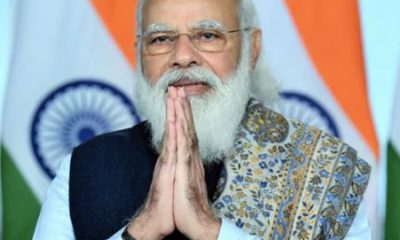World
Fijians crowd around to shake hands with Modi, click selfies

Suva: Thousands of people gathered at Albert Park in this Fijian capital Wednesday to welcome Narendra Modi, the first Indian prime minister to arrive in this Pacific Ocean island nation in 33 years.
Modi, who was accorded a traditional iTaukei ceremonial welcome by the people of Sorokaba in Ba, went around to meet the visitors, and shook hands as many took selfies with him.
Many people travelled from far away to see the prime minister of India.
At the Albert Park, many visitors stood on the chairs to catch a glimpse of Modi as he walked around.
Among the crowd was 76-year-old Hari-Narayan who was at Albert Park to see then Indian prime minister Indira Gandhi during her visit in 1981. He said he was happy at the visit of Modi.
Many primary and secondary school students also took selfies with Modi and shook hands with him.
Modi is here on a day-long visit, during which he held bilateral talks with Prime Minister Voreqe Bainimarama and both sides inked a number of agreements.
Fiji comprises of over 300 islands, although only 110 of those are actually inhabited. The capital and largest city, Suva, is on Viti Levu.
The surface area of Fiji is around 18,274 sq km and this makes the country the 155th largest in the world.
Its population is around 849,000, with over 300,000 persons of Indian origin who have made this Pacific nation their home for over a century. For every square kilometre of Fiji territory, there is an average of 46.4 people living there.
World
Lockdowns in China Force Urban Communities to Defy Censorship and Vent Frustration Online

Shanghai’s rich middle class is leading a wave of online dissent over the strict and prolonged lockdowns imposed in various parts of the country. Chinese internet censorship is struggling as patience is wearing thin in many urban centers, coming up with creative forms of online protests.
Social Media Posts Revealing Lockdown Tension in Shanghai
Drawn-out lockdowns are nothing new in China as authorities insist with the nation’s zero-Covid policy since the start of the pandemic. Currently over This time around, however, metropolitan areas like Shanghai are increasingly difficult to keep quiet, given that its more than 25 million residents have seen weeks of total isolation along with food shortages and many other service interruptions.
Dozens of towns and reportedly over 300 million Chinese citizens have been affected by lockdowns of different severity. As expected, urban netizens have been most outspoken over their difficulties by finding creative ways to get around state censorship and bans placed on topics, news comments and spontaneous campaigns.
Shanghai residents have been using mobile proxies and hijacking seemingly unrelated hashtags to talk about healthcare issues, delivery failures and the overall severity of their situation. The “positive energy” that the Chinese government wants to transmit during the recent prolonged series of lockdowns does not come naturally to those counting food supplies and online censors are working hard to filter words, trending topics and undesired social media sharing.
WeChat groups and message threads are under constant monitoring. Posts questioning the zero-Covid approach have been quickly deleted, including by leading Chinese health experts like Dr. Zhong Nanshan. Video footage is soon censored and protests and investigations are quickly made to disappear.
Where this has not worked, officials have exposed banners with warnings and outright threats like “watch your own mouth or face punishment”, while drones have been patrolling the city skies. Yet, if anything, this has led to further tensions and unspoken confrontation with Shanghai’s educated and affluent middle class.
Creative Online Solutions Harnessing Civic Energy
Announcements by Chinese social media that they would be publishing the IP addresses of users who “spread rumors” have not helped either. Tech industry research has shown that much of Asia’s tech-savvy population has a habit of using mobile proxies and other privacy tools, quickly finding workarounds to browse the internet freely and talk to the world about the hottest topics.
The sheer volume of forbidden posts is already a challenge for the very censorship system, experts explain. Unable to track all trending hashtags, state workers overlook topics that speak about the US, Ukraine or other popular news. Linking human rights elsewhere to their situation, Chinese online dissidents establish their informal channels and “hijack” the conversation to share personal or publicly relevant information about the Covid suppression in their town.
Sarcastic and satirical posts still dominate. Others hope to evade the censors by replacing words from famous poems or the national anthem. One thing is certain – social media, when harnessed with the right creativity, has proven its ability to mount pressure on the government in even some of the most strictly controlled tech environments like China.





















